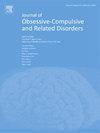Skin picking disorder in sexual minority individuals
IF 1.5
4区 医学
Q3 PSYCHIATRY
Journal of Obsessive-Compulsive and Related Disorders
Pub Date : 2024-10-01
DOI:10.1016/j.jocrd.2024.100914
引用次数: 0
Abstract
Background
Skin picking disorder (SPD) is common, but little is known about whether or how it differs in sexual minorities. We explored whether sexual minority individuals differ from heterosexual individuals in terms of skin picking and comorbidities. We also evaluated potential differences between gay or lesbian and bisexual individuals.
Methods
293 participants with SPD completed an online survey. Sexual minority participants were compared to heterosexual participants on demographics, how often they picked their skin, and validated self-report measures of SPD and comorbidities. Gay or lesbian and bisexual participants were compared on the same variables.
Results
Sexual minority status was associated with more body-focused repetitive behavior (BFRB) impairment and a greater likelihood of picking 7 days per week. Heterosexual participants reported more alcohol misuse, aggression, and compulsive sexual behavior than sexual minority participants. The groups did not differ in overall BFRB severity or rates of other disorders. Gay or lesbian and bisexual participants did not differ in SPD or comorbidities.
Conclusions
The rate of sexual minority individuals in this study (37.9%) is much higher than the rate in the community (about 10%). Sexual minority individuals with SPD may present with unique clinical symptoms. Treatments should be tailored for this population.
性少数群体的皮肤搔痒症
背景抠皮症(SPD)很常见,但人们对其在性少数群体中是否存在差异或差异如何知之甚少。我们探讨了性少数群体与异性恋群体在抠皮和合并症方面是否存在差异。我们还评估了同性恋者与双性恋者之间的潜在差异。性少数群体参与者与异性恋参与者在人口统计学、抠皮频率以及 SPD 和合并症的有效自我报告测量方面进行了比较。结果性少数群体与更多以身体为中心的重复行为(BFRB)损害和每周 7 天抠皮的可能性更大相关。与性少数群体的参与者相比,异性恋参与者报告了更多的酒精滥用、攻击性和强迫性行为。这两组人在身体反应性障碍的总体严重程度或其他障碍的发生率方面没有差异。男同性恋或女同性恋和双性恋参与者在 SPD 或合并症方面没有差异。结论本研究中性少数群体的比例(37.9%)远高于社区比例(约 10%)。性少数群体 SPD 患者可能表现出独特的临床症状。治疗方法应针对这一人群。
本文章由计算机程序翻译,如有差异,请以英文原文为准。
求助全文
约1分钟内获得全文
求助全文
来源期刊
CiteScore
4.00
自引率
5.60%
发文量
46
审稿时长
47 days
期刊介绍:
Journal of Obsessive-Compulsive and Related Disorders (JOCRD) is an international journal that publishes high quality research and clinically-oriented articles dealing with all aspects of obsessive-compulsive disorder (OCD) and related conditions (OC spectrum disorders; e.g., trichotillomania, hoarding, body dysmorphic disorder). The journal invites studies of clinical and non-clinical (i.e., student) samples of all age groups from the fields of psychiatry, psychology, neuroscience, and other medical and health sciences. The journal''s broad focus encompasses classification, assessment, psychological and psychiatric treatment, prevention, psychopathology, neurobiology and genetics. Clinical reports (descriptions of innovative treatment methods) and book reviews on all aspects of OCD-related disorders will be considered, as will theoretical and review articles that make valuable contributions.
Suitable topics for manuscripts include:
-The boundaries of OCD and relationships with OC spectrum disorders
-Validation of assessments of obsessive-compulsive and related phenomena
-OCD symptoms in diverse social and cultural contexts
-Studies of neurobiological and genetic factors in OCD and related conditions
-Experimental and descriptive psychopathology and epidemiological studies
-Studies on relationships among cognitive and behavioral variables in OCD and related disorders
-Interpersonal aspects of OCD and related disorders
-Evaluation of psychological and psychiatric treatment and prevention programs, and predictors of outcome.

 求助内容:
求助内容: 应助结果提醒方式:
应助结果提醒方式:


